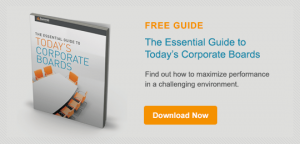Preparing for Board of Director Interviews

It seems to me that almost every executive I speak with aspires to serve on a corporate board. I must say by experience, achieving your first board seat, or even the second will likely be the most difficult, arduous task you will accomplish in your entire professional career. There are a multitude of reasons as to why it is so difficult – the old boy’s network, opportunities never leaving the board room for discussion, the board’s network completing the search within the blink of an eye and the sheer competitive nature of many executives all wanting that first, second or third board seat.
If or when the opportunity comes to interview for a board of director seat, the following is what you should consider…
Preparation
Once you decide that yes, in fact, it is a “healthy” board, you must know the top three reasons why you believe you are the best for the board; in other words, what your value proposition is. Ensure you know, research and internalize this value proposition. Although this is your base, you must still make every interview interaction unique and have something new to bring to each and every interview. There will be numerous interviews once you are in the process. I have personally witnessed as many as ten interviews for one opportunity. You must come back with something fresh and unique each and every time.
Beyond gender or ethnic diversity, a broad strategic perspective, sound judgement or common sense, ethical behavior, intellectual maturity or a collaborative nature… answer the question – what do you uniquely bring that the board cannot get anywhere else? Without that differentiation, you will be just like everyone else, so clearly you must prepare for the value proposition that truly sets you apart.
Research
If you do not have access to a firm like Summit, who develops, prepares and presents all of our research to you, then you have a lot of work to do. You cannot underestimate the power of information. You must locate and review the company’s public filings, financial statements and current composition of the board. You need to determine if public or private company experiences is required and if there are any conflicts with your current role or other boards in which you’re currently serving. You will not only waste your own time but the board’s time if you already know there is a conflict.
Through your research, identify which findings are most critical to the future of the business. Determine the board’s current competencies but also any gaps and the importance of broad, seasoned experience versus trending experience, such as technological innovation or cyber security. Then, understand the board’s current committee composition and think through which committees may benefit from your contribution. What is the chemistry of the board? This cannot be underestimated and can be a show stopper for you or them.
You Will Be Tested
Board members are independent directors – and in my realm, just that… independent. You will be tested for your ability to be independent-minded and unafraid to ask the tough questions of the CEO and remain tough when the situation demands it. There is a dynamic “tension” between being likeable and getting along, but yet appropriately challenging the status quo.
You will be interviewed for your ability to understand what it means to be a board member, your fiduciary responsibilities and your knowledge of how a board room operates. You must be able to articulate why you are interested in serving on their board and how you are motivated by helping to tackle the strategic issues facing the company. You need to know more about the company than they would every anticipate you knowing and be prepared to ask thoughtful business-oriented questions as well as share observations.
If you have prepared properly, you will have a sense of the organizations’ challenges and how you can bring value to solving those challenges. You must have three to four strengths or skills at the ready that addresses those challenges. Put simply, your job is to match yourself up with what they need. You will be quizzed on your knowledge of governance and what you have done to educate yourself through various educational programs. You will also be pressed on your capacity – how many boards do you serve on now (for-profit or non-profit) and your ability to attend board and committee meetings, as well as impromptu conference calls.
There are a host of other questions and advice that our clients access through our Board Interview Guide and through our coaching and preparing them for interviews. The list is long and not to be taken lightly. You must be prepared to ask those interviewing you thought provoking questions, as well. You will have once chance with that first interview and you cannot risk anything.
Reality & Expectations
The bottom line – this takes a long time. The process can take a year, sometimes two years. It is importance to recognize that boards meet once per quarter, therefore networking and having exploratory conversations sooner than later is tantamount to success in landing your first board seat. Be patient – it takes time and a lot of it.

Comments